Social Work with Groups: An Analysis of Therapeutic Communication
VerifiedAdded on 2023/04/23
|6
|1046
|334
Essay
AI Summary
This essay delves into the critical aspects of social work with groups, particularly focusing on therapeutic communication within involuntary environments such as forensic settings. It highlights the influence of societal norms on patient care, emphasizing cooperation and equitable treatment by healthcare providers. The essay underscores the importance of developing therapeutic relationships through empathetic communication, crucial for patient recovery in forensic units. It addresses the challenges faced by nurses in these settings, including safety concerns, high responsibility levels, and emotional trauma, advocating for tailored support programs and strategies to minimize work-related stress. Furthermore, the analysis emphasizes effective management of patient behavior, setting boundaries, and the role of delegative leadership in involuntary environments, ultimately promoting patient empowerment and quality treatment.
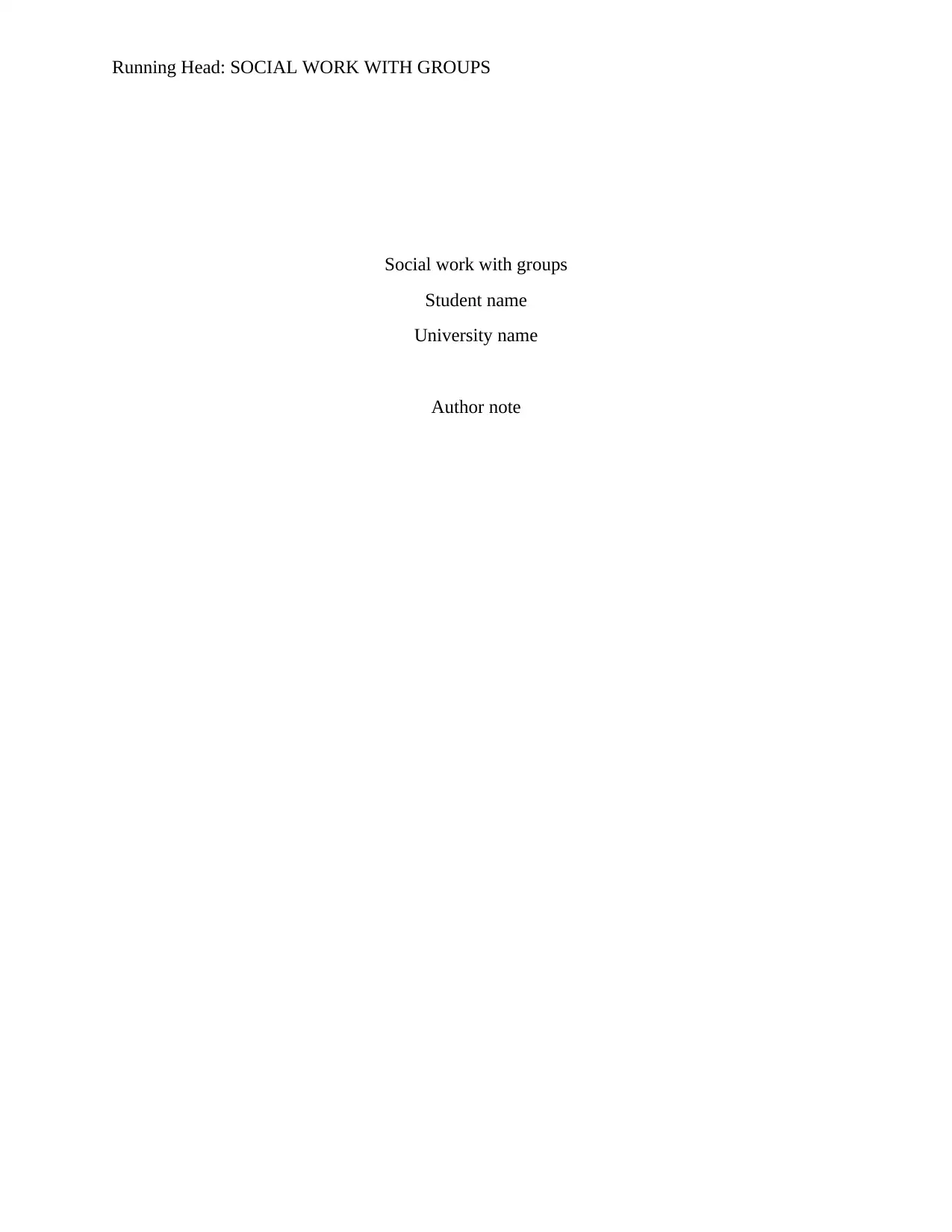
Running Head: SOCIAL WORK WITH GROUPS
Social work with groups
Student name
University name
Author note
Social work with groups
Student name
University name
Author note
Paraphrase This Document
Need a fresh take? Get an instant paraphrase of this document with our AI Paraphraser
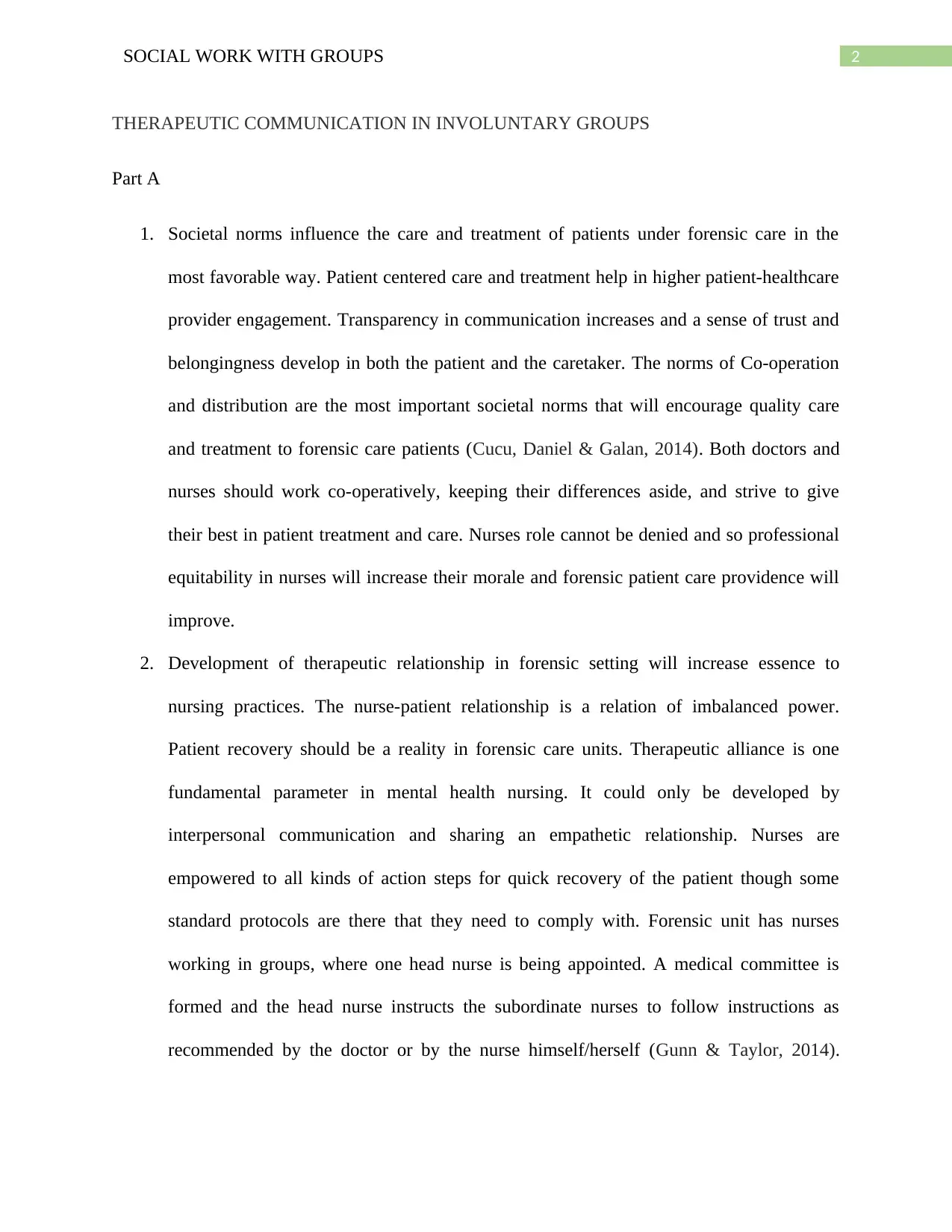
2SOCIAL WORK WITH GROUPS
THERAPEUTIC COMMUNICATION IN INVOLUNTARY GROUPS
Part A
1. Societal norms influence the care and treatment of patients under forensic care in the
most favorable way. Patient centered care and treatment help in higher patient-healthcare
provider engagement. Transparency in communication increases and a sense of trust and
belongingness develop in both the patient and the caretaker. The norms of Co-operation
and distribution are the most important societal norms that will encourage quality care
and treatment to forensic care patients (Cucu, Daniel & Galan, 2014). Both doctors and
nurses should work co-operatively, keeping their differences aside, and strive to give
their best in patient treatment and care. Nurses role cannot be denied and so professional
equitability in nurses will increase their morale and forensic patient care providence will
improve.
2. Development of therapeutic relationship in forensic setting will increase essence to
nursing practices. The nurse-patient relationship is a relation of imbalanced power.
Patient recovery should be a reality in forensic care units. Therapeutic alliance is one
fundamental parameter in mental health nursing. It could only be developed by
interpersonal communication and sharing an empathetic relationship. Nurses are
empowered to all kinds of action steps for quick recovery of the patient though some
standard protocols are there that they need to comply with. Forensic unit has nurses
working in groups, where one head nurse is being appointed. A medical committee is
formed and the head nurse instructs the subordinate nurses to follow instructions as
recommended by the doctor or by the nurse himself/herself (Gunn & Taylor, 2014).
THERAPEUTIC COMMUNICATION IN INVOLUNTARY GROUPS
Part A
1. Societal norms influence the care and treatment of patients under forensic care in the
most favorable way. Patient centered care and treatment help in higher patient-healthcare
provider engagement. Transparency in communication increases and a sense of trust and
belongingness develop in both the patient and the caretaker. The norms of Co-operation
and distribution are the most important societal norms that will encourage quality care
and treatment to forensic care patients (Cucu, Daniel & Galan, 2014). Both doctors and
nurses should work co-operatively, keeping their differences aside, and strive to give
their best in patient treatment and care. Nurses role cannot be denied and so professional
equitability in nurses will increase their morale and forensic patient care providence will
improve.
2. Development of therapeutic relationship in forensic setting will increase essence to
nursing practices. The nurse-patient relationship is a relation of imbalanced power.
Patient recovery should be a reality in forensic care units. Therapeutic alliance is one
fundamental parameter in mental health nursing. It could only be developed by
interpersonal communication and sharing an empathetic relationship. Nurses are
empowered to all kinds of action steps for quick recovery of the patient though some
standard protocols are there that they need to comply with. Forensic unit has nurses
working in groups, where one head nurse is being appointed. A medical committee is
formed and the head nurse instructs the subordinate nurses to follow instructions as
recommended by the doctor or by the nurse himself/herself (Gunn & Taylor, 2014).
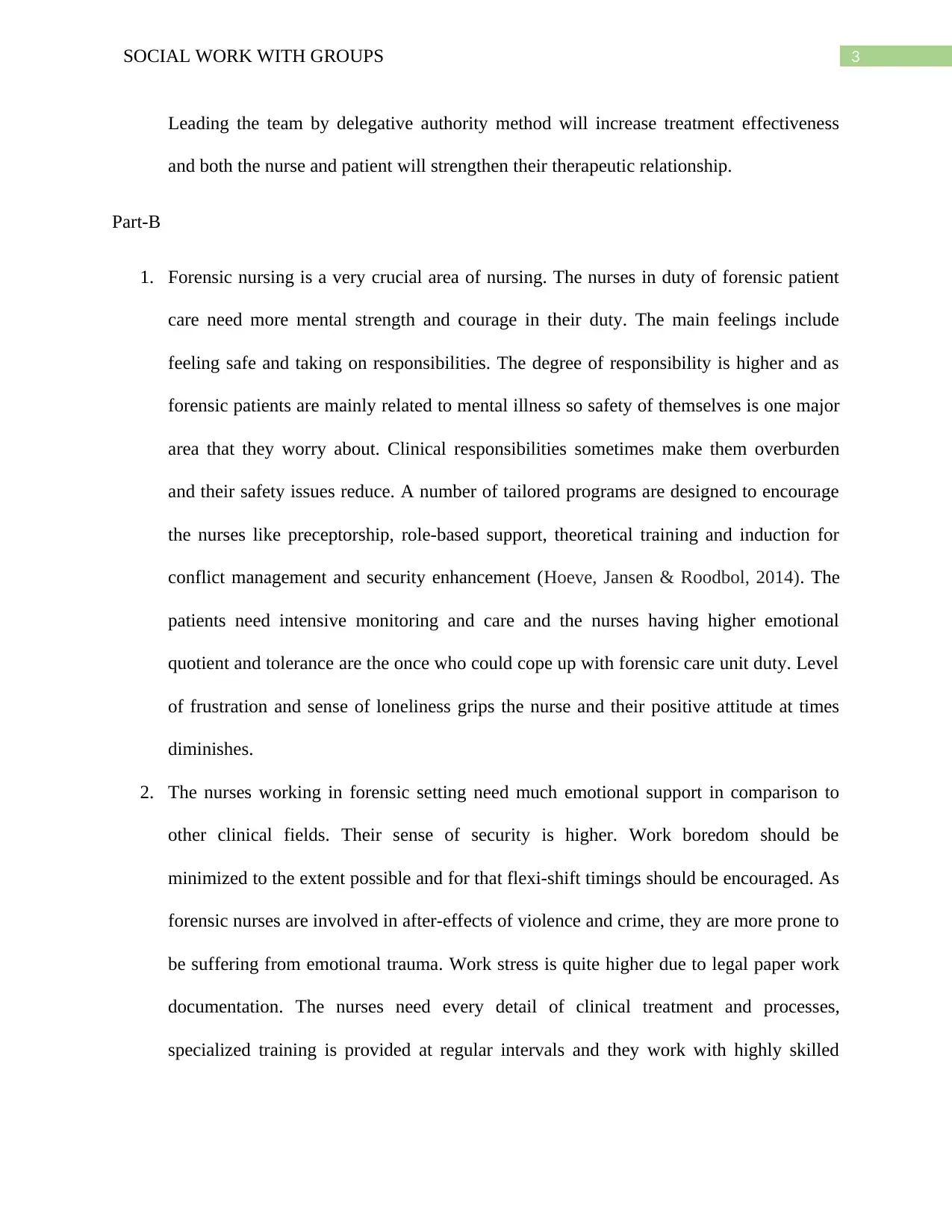
3SOCIAL WORK WITH GROUPS
Leading the team by delegative authority method will increase treatment effectiveness
and both the nurse and patient will strengthen their therapeutic relationship.
Part-B
1. Forensic nursing is a very crucial area of nursing. The nurses in duty of forensic patient
care need more mental strength and courage in their duty. The main feelings include
feeling safe and taking on responsibilities. The degree of responsibility is higher and as
forensic patients are mainly related to mental illness so safety of themselves is one major
area that they worry about. Clinical responsibilities sometimes make them overburden
and their safety issues reduce. A number of tailored programs are designed to encourage
the nurses like preceptorship, role-based support, theoretical training and induction for
conflict management and security enhancement (Hoeve, Jansen & Roodbol, 2014). The
patients need intensive monitoring and care and the nurses having higher emotional
quotient and tolerance are the once who could cope up with forensic care unit duty. Level
of frustration and sense of loneliness grips the nurse and their positive attitude at times
diminishes.
2. The nurses working in forensic setting need much emotional support in comparison to
other clinical fields. Their sense of security is higher. Work boredom should be
minimized to the extent possible and for that flexi-shift timings should be encouraged. As
forensic nurses are involved in after-effects of violence and crime, they are more prone to
be suffering from emotional trauma. Work stress is quite higher due to legal paper work
documentation. The nurses need every detail of clinical treatment and processes,
specialized training is provided at regular intervals and they work with highly skilled
Leading the team by delegative authority method will increase treatment effectiveness
and both the nurse and patient will strengthen their therapeutic relationship.
Part-B
1. Forensic nursing is a very crucial area of nursing. The nurses in duty of forensic patient
care need more mental strength and courage in their duty. The main feelings include
feeling safe and taking on responsibilities. The degree of responsibility is higher and as
forensic patients are mainly related to mental illness so safety of themselves is one major
area that they worry about. Clinical responsibilities sometimes make them overburden
and their safety issues reduce. A number of tailored programs are designed to encourage
the nurses like preceptorship, role-based support, theoretical training and induction for
conflict management and security enhancement (Hoeve, Jansen & Roodbol, 2014). The
patients need intensive monitoring and care and the nurses having higher emotional
quotient and tolerance are the once who could cope up with forensic care unit duty. Level
of frustration and sense of loneliness grips the nurse and their positive attitude at times
diminishes.
2. The nurses working in forensic setting need much emotional support in comparison to
other clinical fields. Their sense of security is higher. Work boredom should be
minimized to the extent possible and for that flexi-shift timings should be encouraged. As
forensic nurses are involved in after-effects of violence and crime, they are more prone to
be suffering from emotional trauma. Work stress is quite higher due to legal paper work
documentation. The nurses need every detail of clinical treatment and processes,
specialized training is provided at regular intervals and they work with highly skilled
⊘ This is a preview!⊘
Do you want full access?
Subscribe today to unlock all pages.

Trusted by 1+ million students worldwide
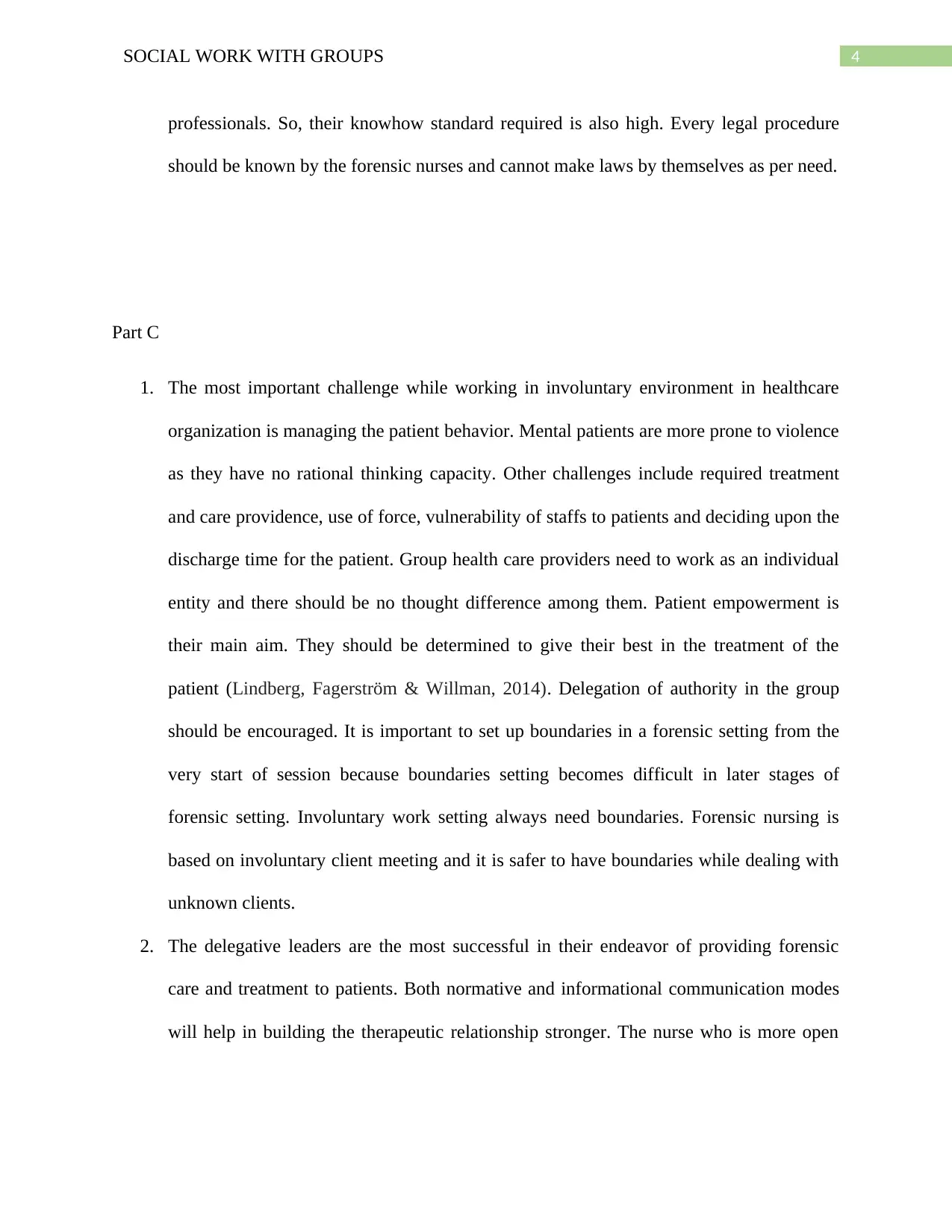
4SOCIAL WORK WITH GROUPS
professionals. So, their knowhow standard required is also high. Every legal procedure
should be known by the forensic nurses and cannot make laws by themselves as per need.
Part C
1. The most important challenge while working in involuntary environment in healthcare
organization is managing the patient behavior. Mental patients are more prone to violence
as they have no rational thinking capacity. Other challenges include required treatment
and care providence, use of force, vulnerability of staffs to patients and deciding upon the
discharge time for the patient. Group health care providers need to work as an individual
entity and there should be no thought difference among them. Patient empowerment is
their main aim. They should be determined to give their best in the treatment of the
patient (Lindberg, Fagerström & Willman, 2014). Delegation of authority in the group
should be encouraged. It is important to set up boundaries in a forensic setting from the
very start of session because boundaries setting becomes difficult in later stages of
forensic setting. Involuntary work setting always need boundaries. Forensic nursing is
based on involuntary client meeting and it is safer to have boundaries while dealing with
unknown clients.
2. The delegative leaders are the most successful in their endeavor of providing forensic
care and treatment to patients. Both normative and informational communication modes
will help in building the therapeutic relationship stronger. The nurse who is more open
professionals. So, their knowhow standard required is also high. Every legal procedure
should be known by the forensic nurses and cannot make laws by themselves as per need.
Part C
1. The most important challenge while working in involuntary environment in healthcare
organization is managing the patient behavior. Mental patients are more prone to violence
as they have no rational thinking capacity. Other challenges include required treatment
and care providence, use of force, vulnerability of staffs to patients and deciding upon the
discharge time for the patient. Group health care providers need to work as an individual
entity and there should be no thought difference among them. Patient empowerment is
their main aim. They should be determined to give their best in the treatment of the
patient (Lindberg, Fagerström & Willman, 2014). Delegation of authority in the group
should be encouraged. It is important to set up boundaries in a forensic setting from the
very start of session because boundaries setting becomes difficult in later stages of
forensic setting. Involuntary work setting always need boundaries. Forensic nursing is
based on involuntary client meeting and it is safer to have boundaries while dealing with
unknown clients.
2. The delegative leaders are the most successful in their endeavor of providing forensic
care and treatment to patients. Both normative and informational communication modes
will help in building the therapeutic relationship stronger. The nurse who is more open
Paraphrase This Document
Need a fresh take? Get an instant paraphrase of this document with our AI Paraphraser

5SOCIAL WORK WITH GROUPS
with the fellow staffs is more successful in delivering their best output in regard to patient
care and quality treatment.
with the fellow staffs is more successful in delivering their best output in regard to patient
care and quality treatment.
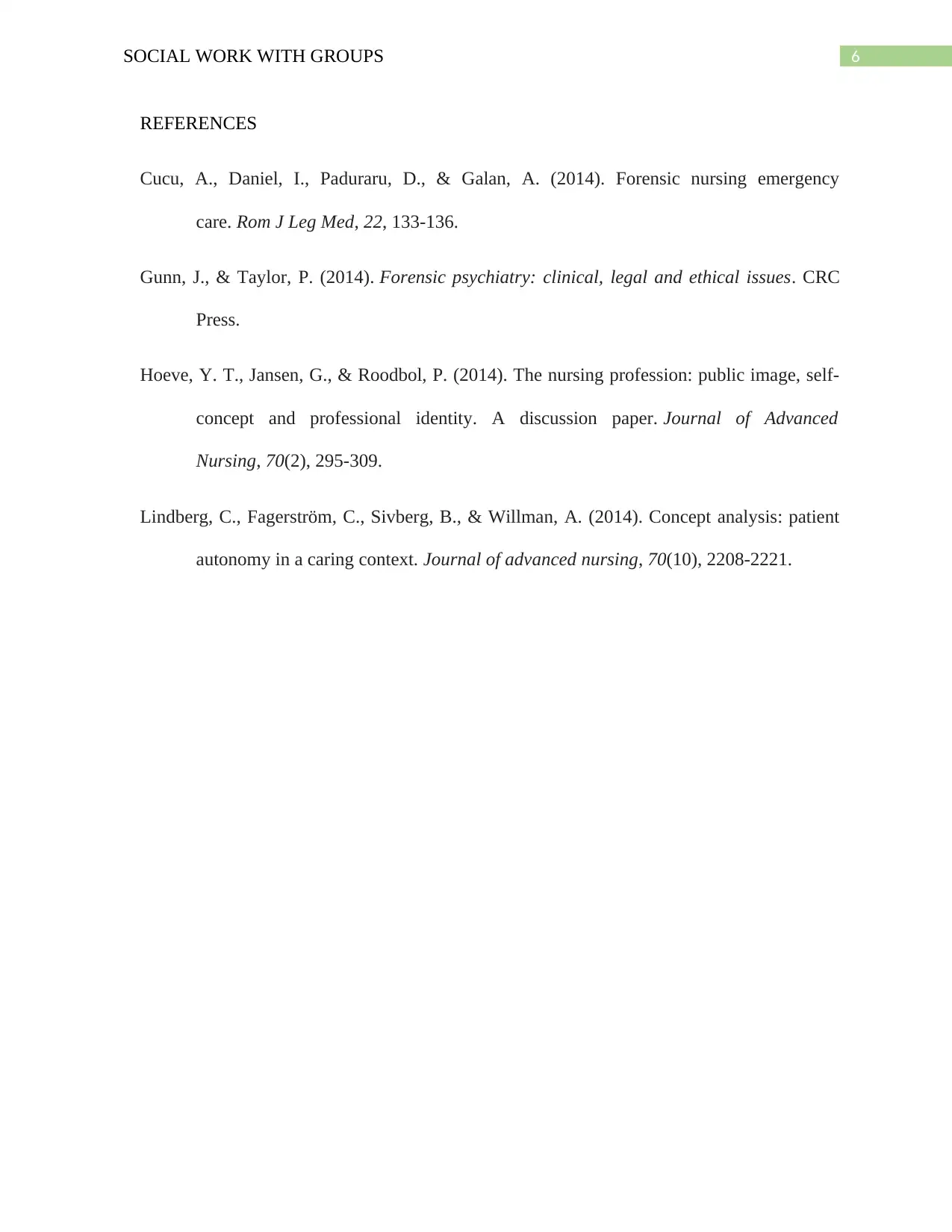
6SOCIAL WORK WITH GROUPS
REFERENCES
Cucu, A., Daniel, I., Paduraru, D., & Galan, A. (2014). Forensic nursing emergency
care. Rom J Leg Med, 22, 133-136.
Gunn, J., & Taylor, P. (2014). Forensic psychiatry: clinical, legal and ethical issues. CRC
Press.
Hoeve, Y. T., Jansen, G., & Roodbol, P. (2014). The nursing profession: public image, self‐
concept and professional identity. A discussion paper. Journal of Advanced
Nursing, 70(2), 295-309.
Lindberg, C., Fagerström, C., Sivberg, B., & Willman, A. (2014). Concept analysis: patient
autonomy in a caring context. Journal of advanced nursing, 70(10), 2208-2221.
REFERENCES
Cucu, A., Daniel, I., Paduraru, D., & Galan, A. (2014). Forensic nursing emergency
care. Rom J Leg Med, 22, 133-136.
Gunn, J., & Taylor, P. (2014). Forensic psychiatry: clinical, legal and ethical issues. CRC
Press.
Hoeve, Y. T., Jansen, G., & Roodbol, P. (2014). The nursing profession: public image, self‐
concept and professional identity. A discussion paper. Journal of Advanced
Nursing, 70(2), 295-309.
Lindberg, C., Fagerström, C., Sivberg, B., & Willman, A. (2014). Concept analysis: patient
autonomy in a caring context. Journal of advanced nursing, 70(10), 2208-2221.
⊘ This is a preview!⊘
Do you want full access?
Subscribe today to unlock all pages.

Trusted by 1+ million students worldwide
1 out of 6
Related Documents
Your All-in-One AI-Powered Toolkit for Academic Success.
+13062052269
info@desklib.com
Available 24*7 on WhatsApp / Email
![[object Object]](/_next/static/media/star-bottom.7253800d.svg)
Unlock your academic potential
Copyright © 2020–2026 A2Z Services. All Rights Reserved. Developed and managed by ZUCOL.





